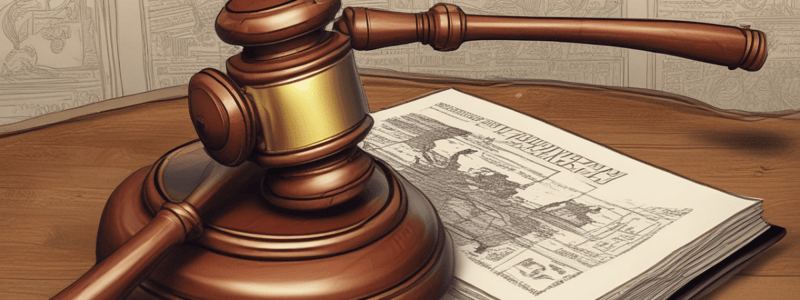Podcast
Questions and Answers
How are the judges and Advocates General of the General Court appointed?
How are the judges and Advocates General of the General Court appointed?
- By common accord of the governments of the member states (correct)
- By the Court of Justice
- By the European Parliament
- By the European Commission
What is the duration of the term of office for judges and Advocates General?
What is the duration of the term of office for judges and Advocates General?
- Lifetime appointment
- 8 years
- 6 years (correct)
- 4 years
What is the requirement for judges and Advocates General to hold office?
What is the requirement for judges and Advocates General to hold office?
- Those required for administrative office in their country
- Those required for the lowest judicial office in their country
- Those required for high judicial office in their country (correct)
- Those required for middle judicial office in their country
How often are partial renewals of the judges and Advocates General made?
How often are partial renewals of the judges and Advocates General made?
What is the role of Advocates General in the Court?
What is the role of Advocates General in the Court?
What is the guarantee for judges and Advocates General once appointed?
What is the guarantee for judges and Advocates General once appointed?
Which of the following types of actions can be brought before the CJEU?
Which of the following types of actions can be brought before the CJEU?
In which area does the CJEU have no jurisdiction?
In which area does the CJEU have no jurisdiction?
Which type of action is brought before the CJEU under Article 267 TFEU?
Which type of action is brought before the CJEU under Article 267 TFEU?
Which court has jurisdiction over disputes involving EU civil servants?
Which court has jurisdiction over disputes involving EU civil servants?
Which of the following is not a type of action that can be brought before the CJEU?
Which of the following is not a type of action that can be brought before the CJEU?
Under which article of the TFEU can the CJEU give an opinion on an international agreement?
Under which article of the TFEU can the CJEU give an opinion on an international agreement?
What is the primary purpose of Article 267 TFEU?
What is the primary purpose of Article 267 TFEU?
Which of the following factors is NOT considered by the Court when determining whether a body is a 'court or tribunal' for the purposes of Article 267 TFEU?
Which of the following factors is NOT considered by the Court when determining whether a body is a 'court or tribunal' for the purposes of Article 267 TFEU?
What is the consequence of a court or tribunal of a Member State failing to refer a question to the EU Court under Article 267 TFEU?
What is the consequence of a court or tribunal of a Member State failing to refer a question to the EU Court under Article 267 TFEU?
What is the significance of the CILFIT case (Case C-283/81) in relation to Article 267 TFEU?
What is the significance of the CILFIT case (Case C-283/81) in relation to Article 267 TFEU?
Which of the following is NOT a requirement for a body to be considered a 'court or tribunal' for the purposes of Article 267 TFEU?
Which of the following is NOT a requirement for a body to be considered a 'court or tribunal' for the purposes of Article 267 TFEU?
What is the effect of a court or tribunal of a Member State failing to meet the requirements outlined in Article 267 TFEU?
What is the effect of a court or tribunal of a Member State failing to meet the requirements outlined in Article 267 TFEU?
What is the primary objective of the cooperation between national courts and the Court of Justice?
What is the primary objective of the cooperation between national courts and the Court of Justice?
Which article is particularly relevant to the obligation to refer a matter to the Court of Justice?
Which article is particularly relevant to the obligation to refer a matter to the Court of Justice?
What is the scope of the obligation to refer a matter to the Court of Justice assessed by?
What is the scope of the obligation to refer a matter to the Court of Justice assessed by?
What is the ultimate goal of ensuring the proper application and uniform interpretation of Community law?
What is the ultimate goal of ensuring the proper application and uniform interpretation of Community law?
What is the relationship between national courts and the Court of Justice in the context of Community law?
What is the relationship between national courts and the Court of Justice in the context of Community law?
What is the consequence of divergences in judicial decisions on questions of Community law?
What is the consequence of divergences in judicial decisions on questions of Community law?
What is the role of the national court in relation to the preliminary ruling?
What is the role of the national court in relation to the preliminary ruling?
What is the condition for the Court of Justice to give a ruling on the interpretation of Community law?
What is the condition for the Court of Justice to give a ruling on the interpretation of Community law?
What is the exception to the principle that the Court of Justice is bound to give a ruling on the interpretation of Community law?
What is the exception to the principle that the Court of Justice is bound to give a ruling on the interpretation of Community law?
What is the requirement for the question to be referred to the Court of Justice?
What is the requirement for the question to be referred to the Court of Justice?
What is the principle established by the case-law of the Court of Justice?
What is the principle established by the case-law of the Court of Justice?
What is the court's approach in examining the conditions in which the case was referred to it?
What is the court's approach in examining the conditions in which the case was referred to it?
Study Notes
Article 267 TFEU
- References for a preliminary ruling can be sent by courts or tribunals of member states, with the concept of "court or tribunal" defined by EU law.
- Factors considered to determine if a body making a reference is a "court or tribunal" include:
- Whether the body is established by law
- Whether it is permanent
- Whether its jurisdiction is compulsory
- Whether its procedure is inter partes
- Whether it applies rules of law
- Whether it is independent (Cartesio, para. 55)
The Duty to Refer on Courts of Last Instance
- Courts or tribunals of member states against whose decisions there is no judicial remedy under national law must bring the matter before the Court (art. 267 TFEU)
- However, there are exceptions for questions on interpretation
CILFIT – Case C-283/81
- Specialized courts: formerly, the Civil Service Tribunal (dissolved in 2016); currently, the General Court and the Court of Justice
The Composition of the Court of Justice
- Appointed by common accord of the governments of the member states
- AGs make reasoned submissions on cases in open court, with the qualifications required being those for high judicial office in their country
- Elected for a period of 6 years, with partial renewals every 3 years
Jurisdiction of the CJEU
- Direct actions: infringement (art. 258 TFEU), action for annulment (art. 263 TFEU), failure to act (art. 265 TFEU), non-contractual liability (art. 268, 340 TFEU)
- Indirect actions: preliminary ruling (art. 267 TFEU), opinion on international agreement (art. 218(11) TFEU)
- No jurisdiction: CFSP (art. 275 TFEU), or review of validity/proportionality of operations carried out by law enforcement services of a member state (art. 276 TFEU)
Distribution of Work in the CJEU
- EU Civil Servants: labour and non-contractual liability disputes
- Natural and legal persons: infringement actions and prior opinions
- EU Institutions: annulment actions, failure to act, and non-contractual liability
- Member States: infringement actions and prior opinions
The Obligation to Refer a Matter to the Court of Justice
- Based on cooperation between national courts and the Court of Justice to ensure the proper application and uniform interpretation of Community law
- Seeks to prevent divergences in judicial decisions on questions of Community law
Questions on Validity or Interpretation
- The Court of Justice can look into its own jurisdiction
- The problem cannot be hypothetical, the question must be relevant, clearly articulated, and the facts must be sufficiently clear
- Examples: Foglia, Filipiak C-314/08, Bacardi-Martini Case C-318/00
Studying That Suits You
Use AI to generate personalized quizzes and flashcards to suit your learning preferences.
Related Documents
Description
This quiz covers the concept of preliminary rulings in EU law, including who can send a question and the role of courts and tribunals in member states.




